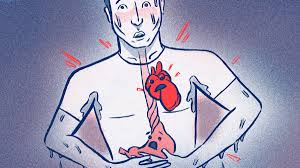Surviving a Panic Attack
Panic episodes are hyperventilation on a physiological level. You’re inhaling much too much oxygen and exhaling far too little carbon dioxide, but your brain tells you to breathe more, more, more! More oxygen! Or you’ll perish! You’re going to die!

This is why you may see people breathing through paper bags to reduce the amount of oxygen introduced into an already oxygen-overloaded system.
We must address this physiological mix-up because, physiologically, it's at the foundation of the problem. We need to learn to slow down our breathing. This allows our brains to relax.
How Do I Survive One?
If you’re starting to feel anxious, or if it’s already at DEFCON 1, attempt the three Bs to help you get through the crisis:
Anxiety can cause you to desire to lower the volume in your head.
1. Body
Find a means to reconnect with your roots. “Get out of your head,” as psychologists say. Be in the here and now. Feel the ground beneath your feet. Feel your feet on the ground, not just imagine or think about them. Pay attention to the micro-sensations of each toe, each inch of flesh on the ground-touching foot. Take note of the gravity and heaviness. You’ve got your anchor now.
You might also use your other hand to hold one of your hands. Take note of the pleasant, warm feelings of touching and being touched on each hand. To remind yourself, “I’m here,” use physical touch to get you out of your head and back into your body. “I’m all right. I’m in my room right now. It’s all anxiety.” I know it can feel like something terrible is occurring, but it isn’t—those are just your thoughts about what has happened in the past or about what might happen in the future.
2. Brain
While you’re calming your body down, find a technique to engage your brain, so it doesn’t think (as many) gloomy thoughts. Start with 50 and add 2, subtract 3 over and over, counting backwards from 100 by 2s, recite the alphabet backwards, and so on. Something that is inoffensive but necessitates mental exertion.
3. Breath
This is the most important one. This may be simpler now that you’ve diverted your attention with busywork and reminded yourself that you’re in your body, right here and now, and not in the abyss of existential despair.
The idea here is to stretch your exhale rather than breathing “deeply,” as this appears to encourage inhaling more oxygen. The parasympathetic nervous system, which helps your body calm down once a threat has passed (think “paramedics”), is activated by lengthening your exhale.
It can be most beneficial to ignore the inhalation (your body is perfectly capable of remembering to inhale on its own) and concentrate solely on the exhale.
Count how long it takes you to catch your first out-breath. Perhaps it’s merely a count of one or two. Try to increase it by one on the next breath. Exhale for 4-6 counts or more, or at least double the length of your in-breath.
Pretend you’re slowly blowing out through a straw to help you relax. Allow a small amount of air to escape in a slow and steady stream for as long as possible.
Repeat for as long as necessary. Re-engage your busywork method if your mind starts to race again (counting backwards, etc.). Return to those body feelings if you begin to feel ungrounded again. Re-anchor. Restart the process. Do this until your breathing becomes more regular and you’re able to glance around the room and observe everything there is to see.
Congratulations, you've survived.
The three Bs are straightforward and easy to remember. You’ll be more likely to recall and utilize them if you practice them outside of crisis situations (automaticity!). You’ll get much more relief if you train a parent, friend, or spouse to slow down and coach you through the procedure when they notice you’re having trouble.
Of course, if you start avoiding people, places, or things you’d otherwise be meeting with, going to, or doing because you’re scared about having another attack in between assaults, it’s probably time to seek professional treatment.






